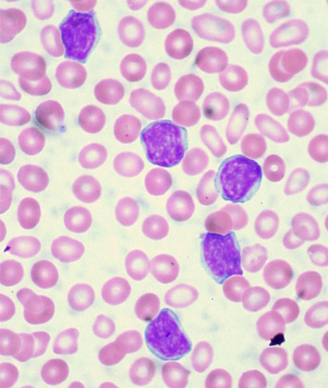Syk Inhibitor Offers Good Activity in CLL Trial
A phase II trial of the selective spleen tyrosine kinase (Syk) inhibitor GS-9973 showed substantial biologic activity in patients with chronic lymphocytic leukemia (CLL).
Chronic lymphocytic leukemia; source: Ed Uthman, Wikimedia Commons

A phase II trial of the selective spleen tyrosine kinase (Syk) inhibitor GS-9973 showed substantial biologic activity in patients with chronic lymphocytic leukemia (CLL). The results (abstract 7007) of the trial were presented at the American Society of Clinical Oncology (ASCO) Annual Meeting, held May 30–June 3 in Chicago.
“Targeted B-cell receptor signaling in CLL has established itself as an effective method for treating these patients,” said Jeff Sharman, MD, of the Willamette Valley Cancer Institute and Research Center in Eugene, Oregon. That signaling pathway begins with SYK, and the novel agent GS-9973 (Gilead Sciences) is selective specifically for that portion of the signaling cascade; its selectivity is hoped to reduce some of the side effects associated with other similar agents.
In this trial, there were five discreet cohorts using a dose of 800 mg twice daily; each cohort enrolled a minimum of 10 patients with varying malignancies, including CLL, diffuse large B-cell lymphoma, follicular lymphoma, and others. If a prespecified futility boundary was exceeded, the cohorts would continue to enroll up until 40 patients, and if it was not exceeded, then that particular cohort would stop accrual. Sharman said that to date all cohorts had passed their futility boundary and are continuing accrual; only follicular lymphoma and CLL have completed the 40-patient accrual.
Safety data were available in a grouping of patients from the cohorts totaling 145 individuals; efficacy data were for 41 CLL patients only. The primary endpoint of progression-free survival (PFS) at 24 weeks was 70% in those patients; the median PFS has not yet been reached, and 75% have a PFS of at least 5.4 months. Amongst the patients who experienced a response, 75% had a response duration in excess of 6.5 months. “It clearly has biologic activity in these patients,” Sharman said.
Fatigue was among the most common adverse events, along with nausea, diarrhea, constipation, and others. Lab abnormalities included anemia and neutropenia in more than 30% of patients, but most adverse events were grade 1 or 2. “Of note, no pneumonitis was seen in this population,” Sharman said. Fourteen percent of patients had grade 3/4 elevation of alanine aminotransferase or aspartate aminotransferase, but this typically occurred early in the treatment course and resolved easily with a dose interruption. In the full safety cohort, there were 19 deaths, 12 due to progressive disease and 7 due to adverse events, none of which were related to the study drug.
Nicole Lamanna, MD, of Columbia University Medical Center in New York, discussed the trial at the ASCO meeting and agreed that GS-9973 is clearly an active agent in these patients. “Long-term data in terms of median PFS and response duration and side effects will need to be followed,” she said, adding that it would be interesting to test this agent in combination with various other therapies.